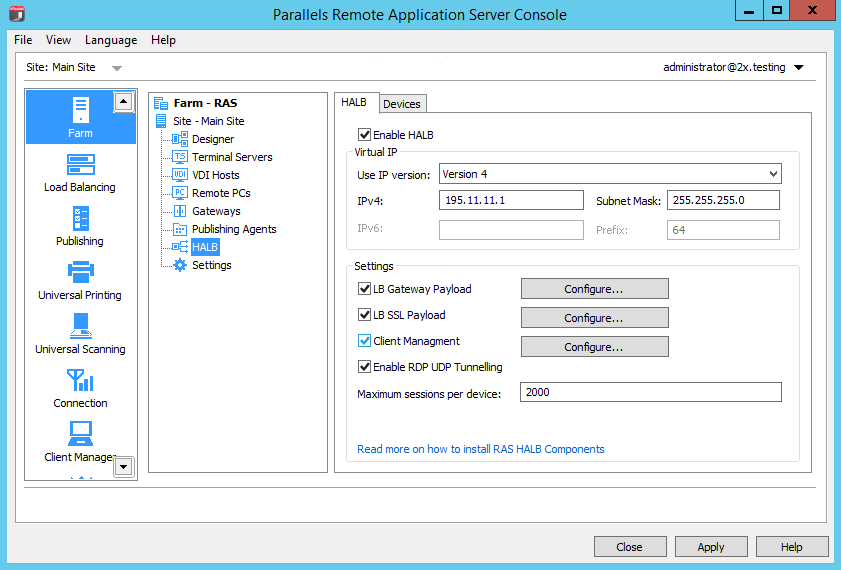Configuring HALB Appliances in the RAS Console
After you install a HALB appliance, you need to configure it in the RAS console as follows:
In the RAS console, navigate to Farm / <site-name> / HALB .

The HALB Tab Page
Select Enable HALB to enable High Availability Load Balancing.
Set the Virtual IP address options as follows:
- Select the IP version (IPV4, IPV6, or both) that you would like to use.
- Specify the IP address (or addresses if both version are selected) and their corresponding property (subnet mask, prefix). This is the IP address that clients will connect to. This will also be a floating IP address used by this and other HALB appliances.
Select the LB Gateway Payload option to load-balance normal gateway connections and then click Configure.
- In the HALB Configuration dialog, specify the port number that will be used by HALB appliances to forward traffic to gateways (the port configured on the gateway).
- Select the gateways that the HALB appliance will load-balance.
- Click OK to close the HALB Configuration dialog and return to the HALB tab page.
If required, select the LB SSL Payload option to load-balance SSL connections and then click Configure.
- In the the HALB Configuration dialog, specify the port number that will be used by HALB appliances to forward traffic gateways (443 by default).
-
In the
Mode
drop-down list, select
Passthrough
or
SSL Offloading
to specify where the SSL decryption process is performed. By default, the SSL connections are tunneled directly to the gateways (referred to as passthrough) where the SSL decryption process is performed.
If you select the SSL Offloading mode, click Configure . The SSL dialog opens.
The SSL Offloading mode requires an SSL certificate to be installed on HALB appliances. Specify the following options in the SSL dialog to generate a new certificate:
- Accepted SSL Versions. Select an SSL version.
- Cipher Strength . Select the cipher strength of your choice. To specify a custom cipher, select Custom and then specify the cipher in the Cipher field.
Click Generate new certificate and enter the required details. The Private Key file and Certificate file options are populated automatically.
Alternatively, click Generate certificate request , fill in the details and click Save to bring up the certificate request window. Click Copy to copy the request. This certificate request should be sent to a certificate authority. Once you receive an SSL certificate from the certificate authority, click the Import public key button and select the certificate file containing the public key.
- In the HALB Configuration dialog, select the gateways that the HALB appliance will load-balance and click OK to close the dialog.
Configure the remaining properties on the HALB tab page:
- Select the Client Management option to enable management of Windows devices connected through HALB.
- Select the Enable RDP UDP Data Tunneling option to enable UDP tunneling on Windows devices.
- The Maximum sessions per device property specifies the maximum number of simultaneous connections allowed. Use the default value or specify your own.
The Devices Tab Page
- Click the Devices tab to add HALB appliances that will be managed by this farm.
- To add appliances:
-
Click
Tasks
>
Add
(or click the
+
icon) to bring up the
Add HALB Devices
dialog.
Parallels RAS is capable of detecting HALB appliances over the network and display them as a list. Selecting detected HALB appliances from this list is the preferred method for adding new appliances. If, for any reason, an appliance cannot be detected, you can add it manually by specifying the appliance IP address in the IP Address field.
- Click OK to close the Add HALB Devices dialog. The appliance is initialized and added to the list on the Devices tab page.
- Finally, click Apply for the new HALB configuration to be applied to all added HALB appliances.
For additional information, please see the following KB article: http://kb.parallels.com/en/123082
|
|
 Feedback
Feedback
|